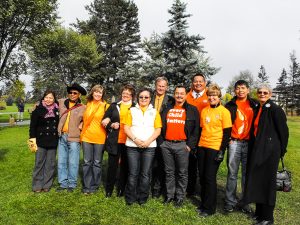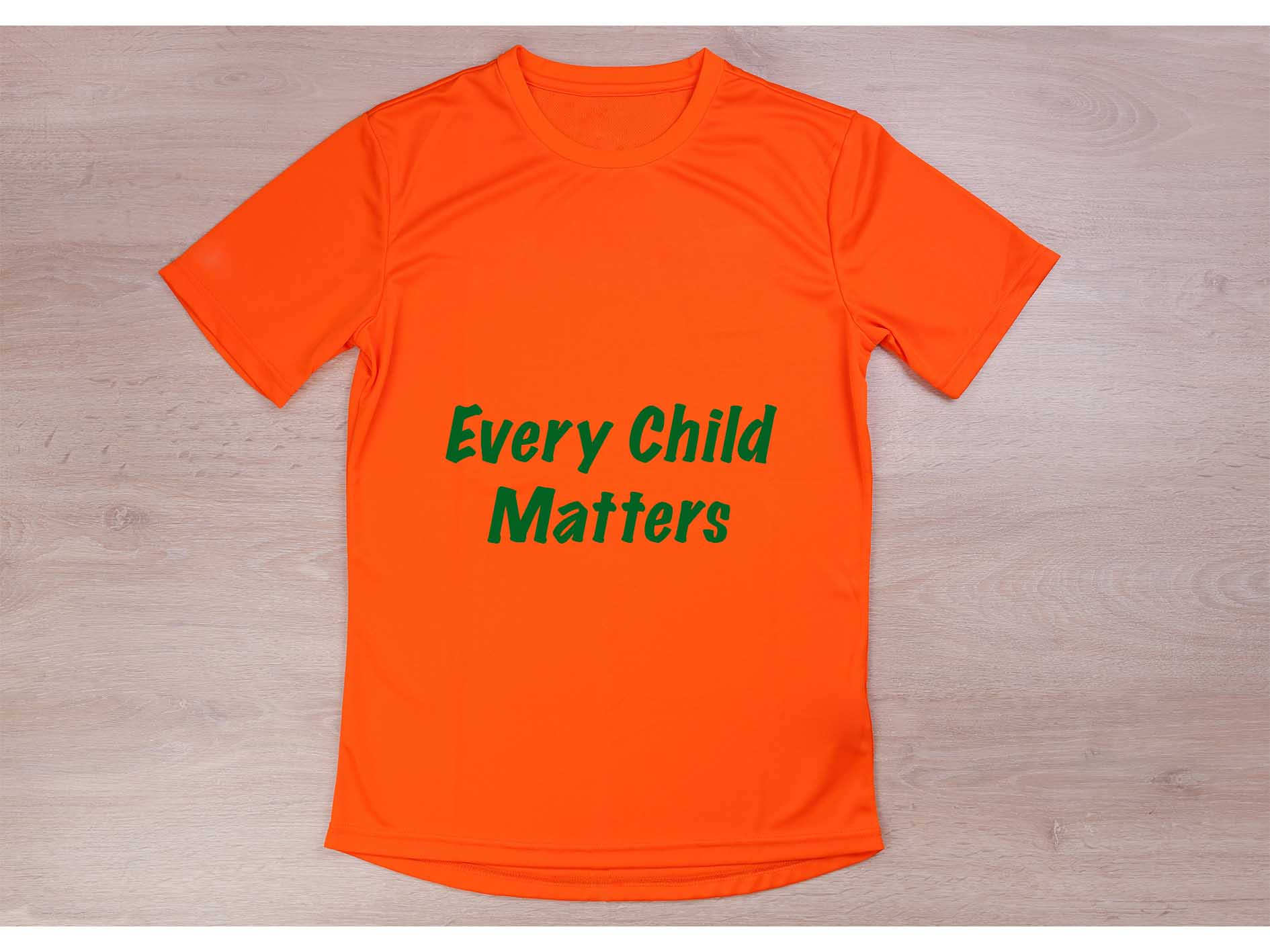Beginning the journey of reconciliation: an interview with Phyllis Webstad
Orange Shirt Day is the legacy of the St. Joseph Mission Residential School Commemoration Project and Reunion that happened in Williams Lake BC in 2013. It is based on the story of Phyllis (Jack) Webstad who attended the Mission in 1973/74 when she was just 6 years old. Her grandmother took her to the store to buy her a new outfit to start her off in her new school; it included a nice bright orange shirt. When Phyllis arrived at the Mission, all her clothes – including the orange shirt- were taken away. She never wore her orange shirt. It’s a reminder of what she and tens of thousands of Residential School survivors lost.
Phyllis Webstad is Northern Secwpemc (Shuswap) from the Stswecem’c Xgat’tem First Nation. She has a son, a step-son and five grandchildren. Ms. Webstad is the Executive Director of the Orange Shirt Society. Here is School Magazine’s interview with her at the end of March.
Would you talk about your experiences as a child going to a Residential School – what happens when the people who ran it take away something as important to you as your clothing – and orange shirt you grandmother gave you?
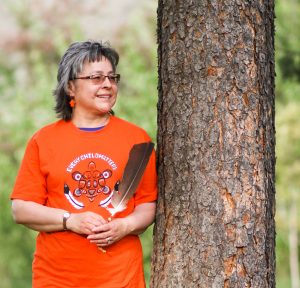
When we first began this work, people didn’t want us talking to children about this history of the Residential Schools because it was so horrific. But with my story, it is one that children can understand even if they’re younger – so the history can begin when they’re at a young age. Obviously, they don’t understand the whole thing at such a young age, but they can empathize that I couldn’t go home, that someone took my clothing, that it wasn’t right. So, they can empathize with that and as they go on with the curriculum, they can learn a bit more and learn a bit more, and by the time they graduate, they have a pretty good idea about what’s going on.
In Williams Lake, the graduating class of 2025 will be the first class that will have the teachings of Orange Shirt Day and the Residential Schools. That’s going to be happening across Canada as well, so I look forward to the change that will make in the attitude of Canadians towards Indigenous people.
Orange Shirt Day is something that appears across Canada now.
Yes, and it wasn’t intended that way. Orange Shirt Day was to be for the Cariboo-Chilcotin area. We do have a new book called “Orange Shirt Day.” It was published last year by the Orange Shirt Society and tells the story of how Orange Shirt Day started. It became known across Canada, because a woman started a Facebook page and handed out little 4×6 cards at the TRC (Truth and Reconciliation) event in Vancouver. That’s how it went viral the way it did – thanks to her and to Facebook.
Are you okay with that? Did you want it to be more focused on your community?
When she called me at home and asked if she could help make this global or viral, I thought okay well maybe a hundred miles to the south, Quesnel to the north, maybe Prince George, or Kamloops or somewhere – help it go more in the area, but it really did go global and it’s taken years to kind of come to terms with that. I’ve always been someone who needed to know everything. I used to drive my grandmother crazy asking questions and talking to people. But I realize that I’ll never know everything, every design, every shirt, every person, every event.
I quit my full-time job in April of 2019 to be the first employee of the Orange Shirt Society. It was either go out on my own and try to figure it all out – how to pay my bills. The Vancity Credit Union at that time took interest in us and donated $40,000. That seed money let me tend to Orange Shirt Society business full-time. I was burning out working at my old job and tending to the Society business. I realized I needed to make a choice between the two and so I chose to work full-time at the Orange Shirt Society. That let me deal with events and happening and people wanting interviews – I needed to be out there and visible because people didn’t even think I was alive. It’s funny; when I went on a tour last year across Canada, a lot of times I’d be introduced as the ‘real’ Phyllis Webstad – like I’m alive -I’m real.
Orange Shirt Day is to support Reconciliation – what else do you think needs to be included in that Reconciliation?
Like Murray Sinclair (head of the Truth and Reconciliation Commission) says, it took 150 plus years to tear everything down; it’s going to take that long to build it back up. Reconciliation won’t happen in my lifetime. So, for my own self, for example, my great-grandmother and my grandmother grew up in pithouses. And then they moved to above-ground structures that the settlers showed them how to make out of logs and then to Department of Indian affairs housing that they built on the reserve. A lot of my generation, and like my son, because we do not live on our reserve, are in urban centres and can’t afford proper housing or a big down payment or to qualify for a mortgage. So, there’s definitely financial or economic reconciliation that needs to happen. Settlers have benefitted from the resources of the land in Canada. A lot of time Indigenous were not allowed access or there were barriers to achieve the same things; they were excluded from participating in the economy.
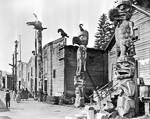
My aunt tells the story of how on our reserve they weren’t allowed to have cattle. So, what the Chief did with the local rancher – the rancher would go to town and sell those cattle and they would tell him what they needed: We need a couple of plow horses, we need a plough, we need a wagon, you know – because they weren’t allowed to own anything or to buy and sell. Even before the Potlatch ban that ended in 1954 was over, they weren’t even allowed to gather to organize themselves. My aunt has another story about how they would go to church and the Chief would get up to say a prayer – they would have their meetings in church. The priest would kind of get a sense of what was happening when people would start giggling and stuff.
That and definitely language needs to be addressed. My grandmother, she was fluent. My mother, is somewhat fluent. My mother will be 74 this year; I’ll be 54 this year – my mom’s 20 years older. She mentors my cousin. I know a handful of language. It wouldn’t take long for me to become fluent if I were to be immersed for a whole year or whatever. I would quickly pick it up; I have the ear and the tongue for it and I can understand a lot of what’s being said. My son understands less; my grandchildren, they probably know 5 or 10 words.
So, it’s building everything back up as much as possible to what was lost.
Could you explain a bit more about the concept of the Orange Shirt Society: “Every Child Matters?”
When we decided on Orange Shirt Day in the Cariboo-Chilcotin, we thought about different months like February or May. We decided on September, because that’s when the children were taken from their homes, and because we wanted it taught in the schools, we thought it would give time for the teacher to settle in, to teach the history and then it would give us enough time to plan an event. So, we chose September 30 because of that. I told my story about being at Residential School and crying and being sick and not being tended to. There was nobody there to tell us that it would be
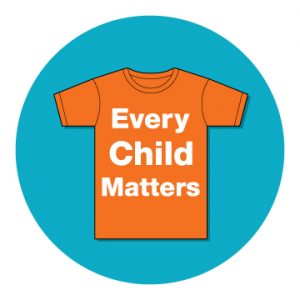
okay, to hug us or hold us. We could be sick, hungry, tired, lonely and it didn’t matter. We didn’t matter and it felt like I didn’t matter when I was there. So, that’s how “Every Child Matters” came about. Every child that went to Residential School – they mattered.
Then, as we talked about it more – and this is an example of how this whole movement has been divinely guided; something else is at play here – our slogan “Every Child Matters” as we went along more, would pertain to the current children in school. We realized after we had chosen it, based on my story, it pertains to the past, present and the future. It’s a no-brainer that every child matters: no matter who you are – Indigenous, non-Indigenous.
We get a lot of emails asking “well, why not all lives matter?” – “why not Indigenous lives matter?” I actually put a statement on our Facebook page about that last year because I was just tired of hearing it and spending time explaining it. So, I just put out a blanket statement and that’s how I respond to it: To me, it was chosen by the ancestors and I’m not going to mess with that. It was meant to be and this is what it is.
You said in your email that you’re “responding to what is happening.” What is happening now that you’re responding to or what projects are you working on?
The biggest thing in the last while has been Bill C-5 – the statutory holiday, the National Day for Truth and Reconciliation – letter writing to MPs, keeping in touch with the Canadian Heritage Minister Stephen Guilbeault’s office and Senator Brian Francis; he is Mi’kmaq. He’s going to be putting forth C-5 in the Senate once it’s received third reading in the House of Commons. It’s been stuck there since the end of November. The Senate is sitting and they could get it done in a week if it gets the time to deal with it. This would allow us to have September 30 as the first statutory holiday, which is to implement the TRC’s recommendation number 80.
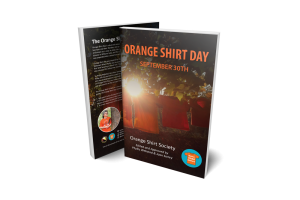
The Orange Shirt Society opened an office in Williams Lake, BC in April of 2019, so it’s just two years old. But our group has been together since 2013. I became the first staff member. I have my cousin working with me; she’s the second staff member. I work with media and one of the things it wants is pictures. I need to figure out pictures for them to use, because there’s not a lot out there. What else? – interviews such as this, CBC National even on issues that aren’t Residential School related, but history related. They wanted to do a story asking me about smallpox and that kind of thing in relation to COVID. And I told them, “Shouldn’t you be talking to someone like the National Chief of the AFN (Assembly of First Nations) for something like this?” They go like “Oh, no, we want to talk to you.” I don’t know – somebody said it’s a respect of my opinion because I’m grassroots and I’ll give them a real story.
We’ve finished a documentary with Canadian Heritage. It’s called “Returning Home” and parallels the Orange Shirt residential school story with the Fraser River salmon. It goes back and forth between the time when I was young, spending summers by the river and how important fishing was to us. I tell a story about a memory, as a child, of making fish head soup. The kids liked the fish heads because the eyeballs were crunchy and we didn’t have money for candy. But then we couldn’t fish on the Fraser, so we couldn’t make fish head soup. We couldn’t fish at all last year because of the high water. The documentary goes back and forth between my story, the Residential School history and the and the struggle with salmon fishing. The producer is from the Williams Lake First Nation, but he lives in Toronto; he has a company there.
I’m on the National Centre Survivor Circle – the NCTR National Centre for Truth and Reconciliation – a lot of stuff goes through it. And one of the things right now is missing children and unmarked burials. So that work is going to be started to deal with that issue in our generation while survivors are still here – to identify graves and do repatriations and ceremonies and monuments and grave markers.
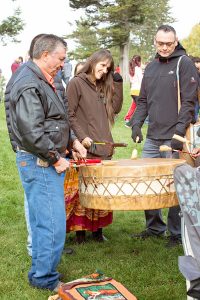
One thing that I have difficulty with, and I’m not sure how to resolve this, is when elementary and high school students send me mail and have lots of questions. Since this all began, I was only able to respond one year in 2017 when a friend helped me. I didn’t respond in 2018; I didn’t respond in to the mail in 2019. It’s probably about 30 pieces of mail, but in that 30 is like 30 other pieces.
It’s hard to be immersed in Residential Schools all the time. Around September, October, I dive in whole – like with my whole being. I give it all that I have and when I kind of come out of that, I don’t want to be reading mail that brings me back there. I haven’t really figured out that piece of how to go about responding to those…. It’s great… I look at the pictures I look at the mail but I just don’t have it in me to figure out how to respond appropriately. It weighs heavily on me … I get emotional because it’s important to respond to that but I just haven’t been able to.
As absolutely valuable as it is, this work seems to have acquired a life of its own…
Definitely, it does have a life of its own and that’s why I needed to quit my job and insert myself into what was happening- to be available, to be visible to go and travel.
I’d really wanted to tell the story of how Orange Shirt Day started and to credit that long line of people. In the book “Orange Shirt Day”, I say I just didn’t get out of bed one day and decide September 30th was Orange Shirt Day. We started working on this latest book in July 2019. By July of 2020, the boxes of finished books had arrived – so it was really fast. The book is out there. I’ve mailed it to MPs and senators, to school district superintendents.
We’re working on a merchandising policy right now. You’d think it would be a given that an Orange Shirt should be orange, but you get a T-shirt company, somebody in Morocco taking the designs they find online and selling them on pink and purple, red and black. We’ve applied for a trademark for “Every Child Matters” so that nobody can use it in the incorrect way. We encourage; we ask people: “If you want to do your own designs, please do. However, put it on an orange shirt and have “Every Child Matters” on it.
What we used to say was we will accept partial proceeds, but if you give partial proceeds to some cause that is Residential School affected, that’s okay. But now we’re asking for partial proceeds because before Christmas this year, before the donations started coming in I thought I was going to have to go on EI. We only had money to keep me and our other staff person on until December. Now, in our policy, we’re asking for partial proceeds to come to us for our operation.
It’s kind of a hideous irony that some company would take your design, put it on a t-shirt that’s produced for low wages and then make a profit on it.
If you do a search for Orange Shirt or Orange Shirt sales you’ll find companies that have taken ours and others’ designs – and they’re selling shower curtains, clocks and bath mats. It’s because of them that we did the trademark application to be able to send them a cease and desist letter. We should hear by this September about our trademark application.
Is there anything you’d like to add that I didn’t ask?
I always bring this whole movement back to my own self and my family and my grandchildren. I have one son – I never did have any more children. I have 5 grandchildren; my oldest grandson
will be 17 this year and the youngest is 2. When I went to school, I did not learn about our history and culture. It wasn’t talked about in the home. So, my grandson is learning alongside me about the pithouses, about the smallpox, the reserves system, about the Residential Schools and all of this. So, I talk to my grandchildren now as much as I can about our history, so that they know when we’re down at the river that we lived in pithouses. I never knew that; nobody ever talked about it. They are learning their history alongside their peers a lot of times and what a difference it’ll make for them.
When I was on a tour for my book “The Orange Shirt Story” in 2018, I was looking at a picture of my family that I would show the kids in different places and I’d explain who everybody is. I realized for the first time in 4 generations, my grandchildren are living under the same roof as their mother and their father.
My grandchildren, and these are Murray Sinclair’s words, are growing up to be who they were meant to be. We didn’t have that – those of us who went to Residential Schools. What a change it’s going to make in the future. My hope for my grandchildren, Indigenous children – all children- is that they have a childhood that they don’t have to recover from.
